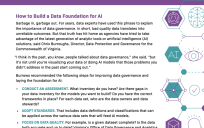While Generative AI (GenAI) holds significant promise in aiding tasks like content generation and customer service, widespread government agency adoption is hindered by various challenges, including hallucinations, a lack of source attribution, and concerns about data security. Vendors offer a bewildering array of GenAI solutions, all of which seem very similar. However, some agencies have paused on evaluations to foster consensus, but the question remains: How can government agencies determine whether it is possible to deploy an effective GenAI solution today?

Government agencies can always leverage standard best practices to evaluate the transformative potential of advanced GenAI technology. In fact, the nature of GenAI makes it possible to choose subsets of the organization’s data to assess the effectiveness of any solution in their environment quickly and effectively. As with past technological innovations, not all GenAI solutions are created equal.
To ensure that your investment aligns with your business objectives, here are six crucial considerations when evaluating GenAI solutions:
- Accuracy and reliability
The most fundamental factor to assess is the accuracy and reliability of the GenAI solution. Many vendors claim to offer Retrieval Augmented Generation (RAG), a framework that collaborates with pre-trained Large Language Models (LLM), providing more specific context to generate responses . However, the effectiveness of the RAG implementation varies. Some produce lengthy search results, including both relevant and irrelevant information for GenAI to process, which typically result in poor outcomes. It is essential for organizations to scrutinize the RAG tool’s track record in consistently providing accurate and dependable results. Consider evaluating its contextual understanding, ability to handle complex queries, adaptability to industry-specific terminology changes, and relevance of its output. Furthermore, organizations should test the tool on their own data and introduce real-time adjustments to assess its performance within their specific context. - Explanation and source attribution
Transparency is critical when evaluating GenAI solutions. Effective GenAI tools not only produce high-quality answers but also offer clear explanations of how they arrived at these conclusions. This capacity to explain is vital for decision-makers who need to understand the rationale behind the AI’s recommendations. Moreover, it ensures compliance with regulations that mandate traceability and source attribution. - Integration and management efforts
Consider whether the GenAI solution is a standalone offering or if it requires integration with other technologies, such as vector databases, semantic search, and natural language toolkits. Seamless integration is essential to harness the full potential of the tool and expedite time-to-production. Evaluate the ease of integration and the comprehensiveness of the GenAI solution to avoid protracted and intricate procurement and implementation processes resulting from integration challenges. - Data security measures
Data security should be a top priority when evaluating GenAI solutions. GenAI solutions require enterprise-grade security measures to safeguard company and customer data. It is equally important to assess whether the organization has the necessary controls in place to ensure adherence to these policies. Examine the tool’s compliance with data protection regulations, such as the European Union’s General Data Protection Regulation, and its ability to deploy open-source LLMs within a virtual private cloud with restricted internet access. A robust GenAI solution should prioritize data privacy and offer customization options to align with your organization’s security policies and regulatory requirements. - Domain-specific understanding
To be truly effective, a GenAI solution should possess the capability to understand or rapidly learn about domain-specific language relevant to your agency. Data labeling, model training, and retraining require significant time and technical resources, which can translate into substantial costs. Enterprises should assess the tool’s ability to efficiently and cost-effectively adapt to jargon, technical terminology, and context-specific intricacies. A GenAI solution that cannot grasp your unique domain-specific requirements may generate generic or irrelevant answers, diminishing its utility in your specific use cases. - Deployment speed
Time-to-value is a critical consideration in today’s competitive landscape. The deployment speed in your production environment directly affects how soon your organization can start benefiting from GenAI. Agencies must also evaluate the tool’s scalability, ease of setup, and ongoing support to ensure rapid implementation. Ideally, the solution should strike a balance between speed and customization to align with any specific requirements.
Conclusion
GenAI solutions offer immense potential to transform business processes and elevate customer experiences, but as the saying goes: buyer beware. Organizations must meticulously evaluate their options and consider accuracy, transparency, integration, data security, domain-specific understanding, and deployment speed. Only then can agency leaders make the most informed decision and select the right GenAI tools that will align with an organization’s business requirements.
Ryan Welsh is the founder and CEO of Kyndi, a global provider of the Kyndi Platform for the Natural-Language-Enabled Enterprise, an AI-powered platform that empowers people to do their most meaningful work. To learn more visit https://kyndi.com/ or follow them on LinkedIn and Twitter.





Leave a Reply
You must be logged in to post a comment.